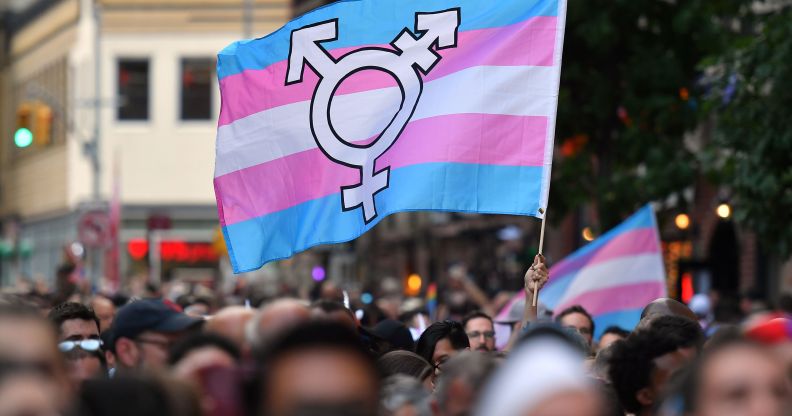Canadian Métis federation votes for non-binary gender option on citizenship cards in ‘respect of basic human rights’

A person holding a transgender pride flag outside the Stonewall Inn at a 2019 rally. (Getty/ AFP/ ANGELA WEISS)
Canada’s Manitoba Métis Federation has unanimously agreed to introduce a non-binary gender option on its citizenship cards – at no extra cost.
Announcing the news on 18 December, Manitoba Métis Federation (MMF) president David Chartrand said: “We want our citizens to be themselves and not have to hide or be denied their identity.”
“We want this resolution to remind all our LGBTQ2+ citizens that you are embraced in our community and your Métis government, and we are proud of who you are,” Chartrand added.
The federation, which represents Métis citizens in the province of Manitoba in Canada, passed a unanimous resolution to introduce non-binary options and said that citizens who want to get updated cards with the new non-binary gender option will be able to do so for free.
“The MMF has always encouraged our people to believe in themselves, and be proud to be themselves,” Chartrand said in a statement.
“The MMF has been on the leading edge of this topic for a number of years among Indigenous peoples,” Chartrand said. “All Canadians must have their basic human rights respected.”
Manitoba already introduced non-binary gender marker for birth and death certificates.
The new, inclusive MMF policy follows a Manitoba Human Rights Commission ruling that led to a non-binary gender option being introduced on birth and death certificates in the province.
In December 2019, Manitoba was ordered to pay $50,000 to a transgender person who was denied the right to have the gender marker on their birth certificate replaced with an “X” in.
The independent Manitoba Human Rights Commission ruled that the government’s position was discriminatory and there was nothing under the law that would prevent a third designation from being offered.
“Gender identity is a part of our concept of selfhood,” stated adjudicator Daniel Manning in the ruling.
“The practice to not allow non-binary designations of sex designation and only permit male or female designations was effectively the government refusing to acknowledge T.A.’s agency and personhood.”
He added: “The difficulties faced by trans and non-binary individuals in our society are many. Human rights tribunals have long recognised the disadvantages faced by trans people and non-binary individuals in society.”
Several other provinces already have the option to select a gender neutral marker on identity documents, including Ontario, Alberta, and Newfoundland Nova Scotia and Labrador.

